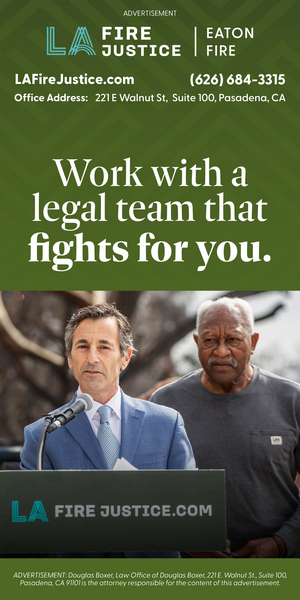Altadena Now is published daily and will host archives of Timothy Rutt's Altadena blog and his later Altadena Point sites.
Altadena Now encourages solicitation of events information, news items, announcements, photographs and videos.
Please email to: Editor@Altadena-Now.com
- James Macpherson, Editor
- Candice Merrill, Events
- Megan Hole, Lifestyles
- David Alvarado, Advertising


Monday, July 28, 2025
The Eaton Fire: Recovery, Recrimination, and Resilience

The aftermath of the January Eaton Fire remains the single most dominant issue shaping the social, political, and economic landscape of Pasadena and Altadena, according to a recap of top news stories last week.
Many of last week’s top topics and trends circled around recovery on multiple fronts, from contentious financial negotiations and grassroots healing initiatives to the starkly divergent futures facing different segments of the fire-scarred region.
On the immigration front, raid and detention fears and a report that the Huntington Hospital Chief of Staff’s husband was taken into custody by ICE added to the local tension.
The Compensation Battleground: SCE, Politicians, and Lawyers
The biggest news of last week on the Eaton Fire front was the newly announced Wildfire Recovery Compensation Program from Southern California Edison (SCE). Rather than being received as a step toward financial resolution for many people, the program has been met with immediate and sharp criticism.
Local attorneys have publicly cautioned that the program could “further victimize people who lost” their homes and livelihoods, suggesting the terms may be unfavorable to fire survivors.
Last Thursday attorney Doug Boxer of LA Fire Justice told Pasadena Now, “Experience suggests that these direct payments for victims are neither quick, nor easy, nor equitable. PG&E offered a similar program and wildfire victims ended up receiving inadequate compensation, and it didn’t happen fast.”
Attorney Richard Bridgford of Bridgford, Gleason & Artinian added that “Their supposed fund is woefully lacking in detail … designed to vastly underpay the victims,” noting that similar programs have provided “In our experience … providing $0.40 on the dollar or less of the true cost to rebuild,” as reported by Pasadena Now.
State Senator Pérez issued a public statement urging Eaton Fire victims to seek legal advice before participating in SCE’s program, explicitly calling for “full and fair compensation.”
The lawyers’ opposition and caution rather than outright acceptance of SCE’s plan by some civic leaders signaled that the path to financial recovery for victims will likely be fought through legal and political channels rather than through the utility’s proposed framework.
At the federal level, President Trump signed a bipartisan bill, the Filing Relief for Natural Disasters Act, championed by Pasadena-area Congresswoman Judy Chu (CA-28). This legislation expands the authority of the Treasury and IRS to grant federal tax filing extensions of at least 120 days for residents in state-declared disaster zones, even before a federal declaration is made.
“Our bill solves … problems by giving Treasury and the Internal Revenue Service authority to postpone federal filing deadlines in response to a request by a governor that has declared a state-level disaster,” Chu said.
This new law provides immediate, tangible relief for Pasadena and Altadena residents affected by the fire, offering some breathing room and financial flexibility as they navigate the complex and emotionally taxing processes of insurance claims and rebuilding.
Community-Led Healing and Memorialization
In the face of institutional friction and financial uncertainty, residents are actively creating their own avenues for healing and remembrance. These grassroots efforts underscore a deep community need to process the collective trauma of the wildfires outside of formal, and often adversarial, processes.
One example was the “Prayer for the Earth Mural” project in Altadena, which took place Saturday. Led by environmental muralist Ekaterina Sky and organized by local business owners, the initiative invited fire survivors to write their prayers and messages directly onto a large mobile mural.
Sky told Pasadena Now that “the most meaningful realization has been how deeply people long for community, especially after loss. This project is about more than art, it’s about collective healing.”
Inscriptions were ceremonially sealed in gold, transforming the artwork into a sacred memorial. The project serves as both a therapeutic outlet and an environmental education tool, with the hope that it will remind the community “that healing the Earth and healing ourselves are one and the same.”
This focus on the psychological and emotional toll of the disaster is also evident in Pasadena.
Maple Counseling, a local mental health organization, is providing specialized art therapy and counseling services to help children and their families cope with the trauma experienced in the aftermath of the January wildfires. Concerns have arisen about the long-term mental health impacts on the community’s youngest members.
Complementing these therapeutic initiatives is an effort to preserve the human stories of the fire. High school students are actively creating an oral history project and hosted a “Listening Session” on Saturday, July 26, at the Pasadena Playhouse, to document the experiences of residents.
Tale of Two Altadenas: Preservation Amidst Devastation
The events of the past week have cast a harsh light on a stark socioeconomic divide within Altadena, indicating two disparate communities on divergent paths. While one segment of the community is fighting for its very survival, another celebrated its historical preservation, creating a powerfully contrasting narrative.
On one hand, the Los Angeles County Board of Supervisors, with the vocal support of Supervisor Kathryn Barger, officially designated the Historic Highlands neighborhood as Altadena’s first-ever historic district.
“Altadena recently suffered a great loss, and it is especially meaningful to take this action now to ensure that the community’s historic treasures are preserved,” Barger said.
This designation, which affects 77 parcels of primarily early-20th-century homes, is the culmination of years of local advocacy by property owners. The official announcement explicitly notes that the neighborhood, celebrated for its “Craftsman, Spanish Colonial Revival, Tudor, and other period styles,” was not impacted by the Eaton Fire. This action preserves the architectural heritage and, by extension, the property values of an affluent and untouched part of the community.
Simultaneously, national media outlets have turned their focus to a profoundly different story just miles away in East Altadena.
A PBS News Hour special report detailed how the Eaton Fire disproportionately devastated Altadena’s historically Black neighborhoods, which have served as a “haven and a place of solidarity” for generations. The report highlights that nearly half of Black households had their homes destroyed or severely damaged, raising significant concerns about the ability of these families to rebuild in the face of soaring costs and inadequate insurance coverage.
According to a UCLA study reported by Pasadena Now, Lorrie Frasure, a professor of political science, stated, “Altadena’s Black community has long served as a symbol of resilience and opportunity in the Los Angeles region, but the Eaton Fire exposes how decades of segregation and the legacy of redlining practices have left Black households more vulnerable.”
A similar story on the CBS Weekend News focused on a single Black family that lost 20 homes, destroying decades of accumulated generational wealth and legacy in the community.
The juxtaposition of these two narratives is difficult to ignore. The successful preservation of architectural heritage and wealth in one part of Altadena is occurring at the very moment the historical legacy and financial foundation of another, historically marginalized community are facing potential erasure.
The Logistics of Rebuilding
Amid the political and emotional turmoil, concrete steps are being taken to address the monumental task of rebuilding. A multi-pronged approach involving nonprofits, private enterprise, and community organizations is emerging.
A significant development is the establishment of the Altadena Builds Back Foundation. Spun off from the well-established Pasadena Community Foundation, this new entity is armed with $55 million in donations specifically earmarked for Altadena’s long-term recovery. The foundation’s board includes local residents with experience in disaster planning and finance, and its strategy may include land banking to prevent speculative real estate acquisition and assisting residents with the construction of modular homes.
Board member Mark Mariscal told Pasadena Now that “as a longtime Altadena homeowner who lost everything in the Eaton Fire, I appreciate all the efforts of the Pasadena Community Foundation in addressing not only the immediate impacts of the disaster but also having the forethought to plan ahead meaningfully and create an entity that will serve Altadena with housing recovery for years to come.”
In the private sector, homebuilder PLC Communities said it has initiated a partnership with 24 Altadena families who lost their homes. The project will utilize a set of six pre-approved architectural plans created by Bassenian Lagoni architects, a model designed to expedite the rebuilding process for these families.
These larger efforts are supplemented by more localized aid. The Rotary Club of Altadena announced the recipients of its second-quarter Altadena Rotary Fire Recovery Grants, reinforcing its commitment to helping the community rebuild from the ground up.
Altadena Calendar of Events
For Pasadena Events, click here











